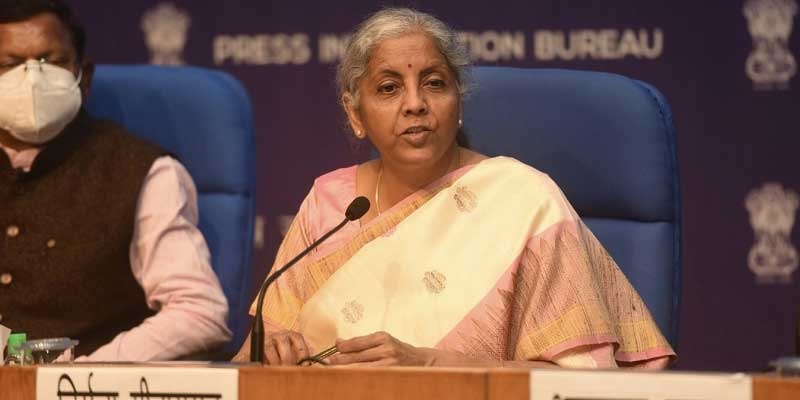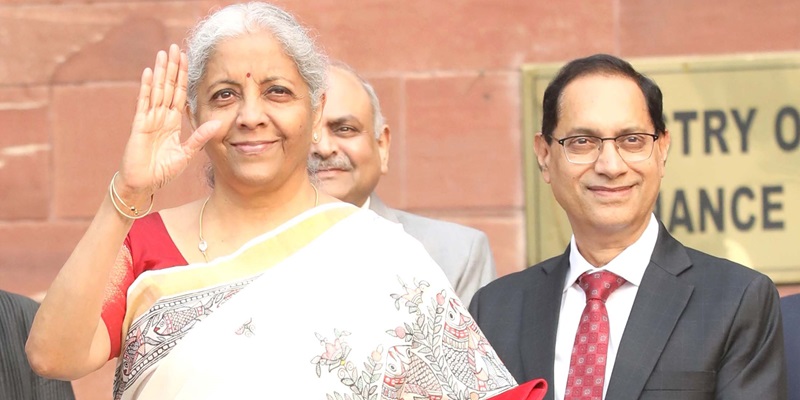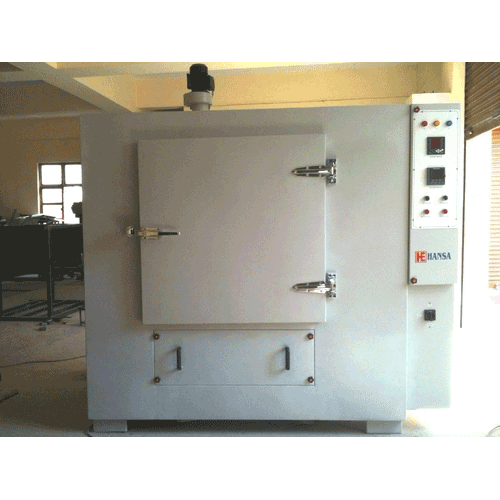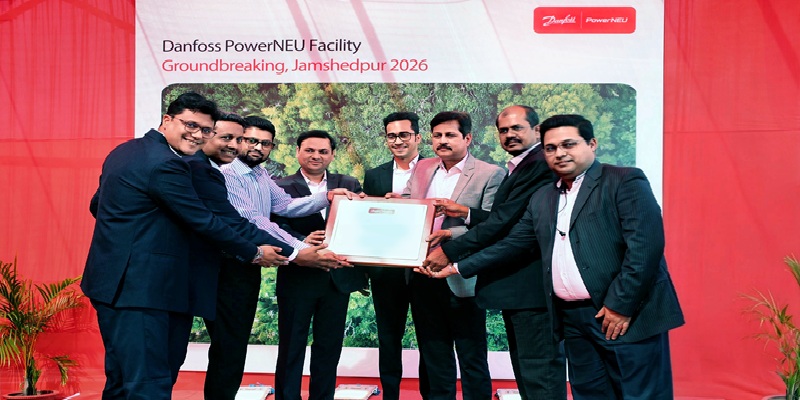Schedule a Call Back
India’s growing economy gets budget’s booster dose
 Industry News
Industry News- Mar 03,22

Year 2021 saw demand returning back with activity in the manufacturing sector gaining momentum. Against this back drop, Finance Minister Nirmala Sitharaman presented budget 2022-23 that aims to address the long-term growth prospects in a clear and precise manner. "Measures such as higher infrastructure spends, expansion of the highway network, addition of modern trains and a focus on the rural economy will have positive long-term impact on the manufacturing and mobility sector. The reforms to do away with old clearance systems will make it easier to business in India and it is likely to unlock a fresh wave of investment. The focus on clean tech, policies on urban planning, battery swapping etc are a clear direction towards much needed steps to meet the long-term sustainability targets. The policy push with the right levers of PLI scheme is likely to further spur the development of the entire EV ecosystem in the country," said Harsha Kadam, Managing Director & CEO, Schaeffler India Ltd.
In addition to addressing issues related to economic growth, Budget 2022 also lays strong impetus on sustainable development. Anil Chaudhry, MD and CEO, Schneider Electric India Pvt Ltd, commented, "Sustainability has steadfastly become an urgent priority and the proposal to issue sovereign green bonds for building green infrastructure will go a long way in creating a low carbon future and reducing carbon intensity of the economy. This is in line with the government’s commitment on climate action at COP 26. The budget also emphasizes on energy efficiency and energy transition for reducing emissions. Saving energy is an important aspect of energy management. Hence, energy efficiency and savings measures will be promoted. This will be done in large commercial buildings through the Energy Service Company (ESCO) business model. It will facilitate capacity building and awareness for energy audits, performance contracts, and common measurement & verification protocol. The proposal of thematic funds for mobilising blended finance with government share capped at 20% will also allow fund mobilization for emerging sectors like digital economy and climate action."
Budget saw the launch of the sovereign green bonds, which will significantly help reduce the carbon intensity in the years to come. "The announcement of the Finance Minister to issue sovereign green bonds to mobilize resources required for green infrastructure will certainly help boost the financing of clean energy projects, thereby providing an impetus to the Indian energy sector. With Approved Module Manufacturer List becoming applicable from April 2022, the allocation of an additional Rs 19,500 crore under PLI scheme for solar would help create much needed manufacturing ecosystem. The enhanced focus on electric mobility is showcasing the clear desire to mainstream this emerging industry. Overall, the budget is giving clear direction for India to meet its COP26 commitments by 2030," said Manish Chourasia, Managing Director, Tata Cleantech Capital Ltd.
Mahesh Palashikar, President, GE, South Asia, added, "For India to achieve its climate goals, financing is the need of the hour. This will require deep public-private partnerships. We at GE, have been investing in sustainable technologies for decades. We welcome the encouragement to private industry for taking up the design and development of military platforms and equipment in collaboration with DRDO. We are committed to bringing those technologies in the areas of sustainable aviation, green hydrogen, emission controls and decarbonization to India to support the country’s goals."
Budget 2022 has laid the foundation for India@100 with the Government showing its commitment towards a sustainable and a greener future for Indians. The much-needed impetus towards climate action has been observed in this year’s budget. "While nearly half of our population is residing in urban areas, the focus on sustainable measures for megacities must also include sustainable management of water and wastewater to prevent loss of water, improve recycling and also reduce destruction from natural calamities such as floods and droughts. The roadmap of transitioning towards a circular economy across sectors is also a welcoming move and will have a direct impact on our fight against climate change. The introduction of sovereign green bonds for funding of green infrastructure and the energy audit mechanisms for large commercial buildings will be a game-changer for infrastructure projects, enabling further carbon reduction while we grow our economy by leaps and bounds," said George Rajkumar, Country President, Grundfos India.
Speeding growth
FM announced that the big public investment for modern infrastructure, readying for India at 100, will be guided by PM GatiShakti and be benefited by the synergy of multi-modal approach. PM GatiShakti - a transformative approach for economic growth and sustainable development - will be driven by seven engines - namely, Roads, Railways, Airports, Ports, Mass Transport, Waterways, and Logistics Infrastructure.
Sunil Mathur, Managing Director and Chief Executive Officer, Siemens Limited, added, "We welcome the growth-oriented budget with a focus on the four pillars – productivity, climate action, financing investments, and PM Gati Shakti plan. These are concrete steps in the right direction, and over time should positively impact the economy. The increased Capex outlay of Rs 7.50 lakh crore further demonstrates the intent of the government to create the necessary impetus for the economy. Stability in tax policy is also a welcome step."
According to the Finance Minister, India is poised to regain its title of the fastest-growing large economy with a 9.2% GDP growth estimated for the coming year. With an enhanced capital expenditure outlay of 35% as compared to last year, core infrastructure segments including Railways and Urban Transport stand to benefit and will have a huge multiplier effect on the economy. Alain SPOHR, Managing Director, Alstom India & South Asia, commented, "Highlight of the budget was the announcement to introduce 400 new Vande Bharat trains over the next three years, introduction of the state-of-the-art KAVACH TCAS signalling systems over 2000 kms of railway network, larger investments to provide for sustainable and integrated urban transport systems. The total budget estimates of Rs 23,875 crore for MRTS & Metro Projects will incentivise faster implementation of projects and the standardisation of metro design systems will provide the much-needed stability for manufacturers."
The development of 100 Cargo terminals over the next 3 years will also improve India’s competitiveness in faster and cleaner logistics and freight movement by rail. "The announcement of a new legislation regarding Special Economic Zones is a welcome step as it will help India enhance the competitiveness of its exports and integrate successfully with global supply chains. From a policy standpoint, launch of the next phase of Ease of Doing Business (EoDB 2.0), is a step in the right direction. Modernized rules for evaluation of complex tenders especially transparent quality criteria and provisions for payment of 75% of running bills mandatorily within 10 days will encourage faster dispute resolution," said Alain SPOHR.
Introducing PLI scheme for railway manufacturers and exporters promoting Make-in-India would have been ideal for fast-tracking the implementation of projects and supporting the manufacturing ecosystem. Alain SPOHR said, "We were anticipating FM’s announcement regarding plans for the private train operations; however, this budget provides the overall push towards economic growth and addresses the key priorities of the Government."
Propelling consumption
Budget for 2022-23 has a thrust for the social sector with investments in primary and vocational education, provision for drinking water to reach more households and the extension of the PM Awas Yojana to provide housing. In addition, its outlay for procurement of agricultural produce will reward the farmers for their effort and put money in their hands which will help to propel consumption demand.
Anil G Verma, Executive Director and President, Godrej & Boyce, said, "The focus on the logistics sector through the PM Gati Shakti plan will give a fillip to the economy. Logistics costs in India count among the highest in the world. Creation of infrastructure is the best way to reduce the costs and introduce competitiveness in the economy to serve both the domestic market and exports. The initiative of spurring investments from the private sector by taking the lead through government investments of Rs 7.5 lakh crore is laudable. The PLI scheme outlay for solar modules will support the solar power generation projects which are currently facing steep cost increases and supply constraints. Support for domestic manufacture of capital equipment by doing away with duty exemptions is also a welcome step."
Reforms in customs administration will no doubt support both the SEZs as well as other manufacturers in the domestic tariff area. "Our SEZs are vulnerable to both disruptions in the global supply chain and also the emphasis on domestic sourcing that we increasingly see overseas. Permission to sell part of the capacity in DTA while maintaining a level playing field with domestic manufacturers will enhance scale and competitiveness whilst reducing reduce vulnerability," opined Anil Verma.
The economy is on a slow recovery path and the budget seeks to accelerate the growth through investments. “The 2022 budget has a remarkable approach towards growth orientation. With a substantial focus on housing and infrastructure development, it provides a promising outlook that will provide a much needed boost to the economy. The provision of chemical free agriculture is good move towards health improvement and it will also help in increasing exports. The PM GatiShakti master plan will definitely aid in reducing logistics costs in the long term. The support for urban capacity is going to improve efficiency and will also provide some relief in reducing the cost of real estate which is the need of the hour in order to afford a good living," stated Shreegopal Kabra, Managing Director & Group President, RR Global.
According to Kirti Kabra, Director, RR Global, budget 2022 promotes overall economic development including the non-metro cities as well and an overall improvement in the standard of living. "The affordable housing scheme is a huge step by the government that will impact the lives of 80 lakh families aspiring them to have their own houses in future. This will boost economic growth and will improve the overall living standards of the people. The support for urban capacity building will open up new possibilities for the citizens in non-metros thereby encouraging people to settle in these cities with a better quality of life. The expansion of National Highway network will help smoothen transportation and reduce the logistic costs thereby also providing opportunities for growth to the smaller towns nearby. The Green Energy & Clean Mobility provision will certainly promote better health, ease of living and reduce mobility cost," said Kirti Kabra.
MSMEs in focus
While the highlight of the budget was on healthcare and infrastructure sector, some prudent initiatives for MSMEs and India Inc for start-ups have also been announced. To facilitate energy management, Government of India has promoted the adoption of the Energy Service Company business model for large commercial buildings. Ravichandran Purushothaman, President of Danfoss India, said, "By enabling capacity building and energy audits, performance contracts, common measurement and verification protocols, this service helps in imbibing energy savings as a core value in industries across India. By providing major financial allocations to energy efficiency and data centres the path towards clean energy storage is clearer than ever. We hope that Budget 2022 acts as a guiding force to lead our government’s 'India@100' initiatives.â€
The Finance Minister reiterated Government’s commitment to the policy of stable and predictable tax regime. The announcements continued to build on the themes of the previous year, such as infrastructure, education, health, housing and ease of doing business. Ram Iyer, Founder & CEO, Vayana Network, commented, "The substantial increase in capex is expected to have a multiplier effect and a tightrope to manage between growth and inflation. The extension to Emergency Credit Line Guarantee Scheme (ECLGS) was expected and needed to ensure the growth and survival of MSMEs. Linking of various MSME portals, and initiatives announced towards skill development, credit and market access reflect Govt.’s commitment towards the growth of the critical sector. The other interesting announcement of bringing post office accounts onto a Core Banking System will make interoperability possible, resulting in the next phase of growth for UPI and other digital infrastructure. This will also bolster the public welfare and delivery contributing towards financial inclusion of the country."
Ashish P Dhakan, MD & CEO, Prama Hikvision India Pvt Ltd, added, "There is a greater focus on the MSME sector in the budget and as a key stakeholder of the MSME Ecosystem, we feel this a very positive step for the security industry. The government has announced that Udyam, e-shram, NCS and ASEEM portals will be interlinked. The help is provided to 130 lakh MSMEs as additional credit under Emergency Credit Linked Guarantee Scheme (ECLGS). The extension of this scheme till March 2023 is a thoughtful decision. The firm focus on Skill Development is another positive aspect of the union budget. Digital Ecosystem for Skilling and Livelihood (DESH-Stack e-portal) will be launched to empower citizens to skill, reskill or upskill through on-line training. Overall, a pro-growth budget with a vision for the new emerging India on the global front."
Related Stories
Budget aims to integrate India with global supply chains, boost manufacturing
Through the budget, the Union Government will support the domestic electronic equipment industry to leverage the opportunity of Industry 4.0. National framework for states to be formulated for promo..
Read more
Budget launches National Manufacturing Mission, revises MSMEs classifications
To boost exports, an Export Promotion Mission will be established with sector-specific and ministerial targets, says budget 2025-26.
Read more
Budget 2025 aims to boost economy by propping up consumption, rejigs duties
FM Nirmala Sitharaman mentions agriculture, MSMEs, investments and exports as four crucial engines to propel the country's growth.
Read moreRelated Products

Heavy Industrial Ovens
Hansa Enterprises offers a wide range of heavy industrial ovens.

High Quality Industrial Ovens
Hansa Enterprises offers a wide range of high quality industrial ovens. Read more

Hydro Extractor
Guruson International offers a wide range of cone hydro extractor. Read more
















